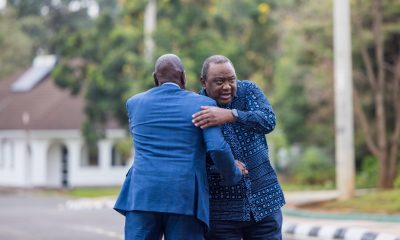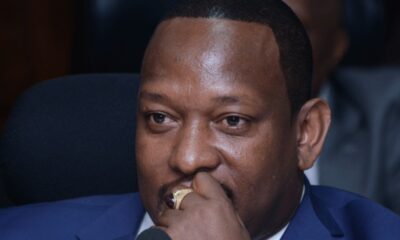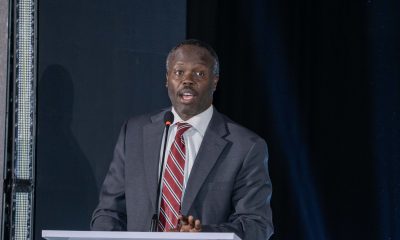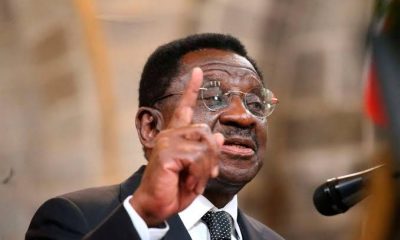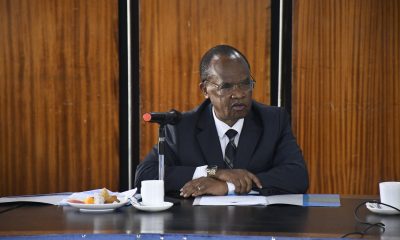Investigations
The Behind Scenes and State House Hand That Forced Prof Amukowa Anangwe to Resign as UoN Council Chair
The crucial meeting on Thursday, May 22, 2025, between UoNPA representatives and Head of Public Service Felix Koskei appears to have been the decisive moment that sealed Anangwe’s fate.
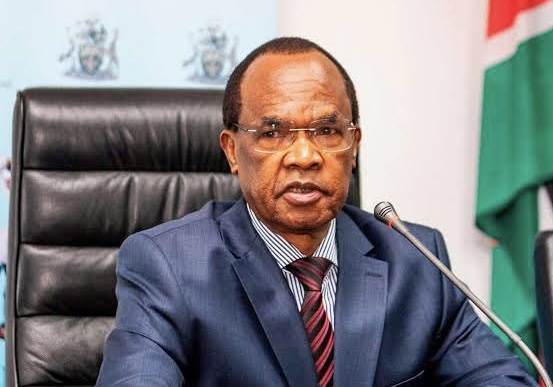
High-level government intervention and faculty pressure culminated in the dramatic exit of the embattled university leader
The resignation of Professor Amukowa Anangwe as Chairman of the University of Nairobi Council on Monday represents the climax of a carefully orchestrated campaign involving Kenya’s highest offices of power, revealing how State House and senior government officials moved decisively to end months of institutional chaos at the country’s premier university.
Sources close to the negotiations reveal that Anangwe’s departure was far from voluntary, emerging instead from intense behind-the-scenes pressure that escalated to the highest levels of government when conventional ministry interventions failed to resolve the crisis.
The professors’ gambit
The turning point came when the University of Nairobi Professors’ Association (UoNPA), initially serving as mediators between the embattled council and the Ministry of Education, found themselves transformed from peacemakers to power brokers in a high-stakes political drama.
UoNPA Chairman Peter Wasamba’s revelation that the association “escalated the matter to the Office of the President” after failing to broker a solution marks a significant moment when academic disputes crossed into the realm of executive intervention.
“When we were unable to find a solution, we escalated the matter to the Office of the President and sought audience with the Head of Public Service Felix Kosgey,” Wasamba disclosed, underlining how the university crisis had reached a level requiring presidential attention.
The Koskei meeting: A diplomatic ultimatum
The crucial meeting on Thursday, May 22, 2025, between UoNPA representatives and Head of Public Service Felix Koskei appears to have been the decisive moment that sealed Anangwe’s fate. While sources remained tight-lipped about the exact content of discussions, the message delivered was unambiguous.
One insider’s stark assessment that the council “didn’t have an option but to resign” suggests that what transpired was less negotiation than notification of an irreversible decision already taken at the highest levels of government.
Koskei’s carefully worded public statement, emphasizing “the government’s commitment towards streamlining matters University of Nairobi,” carried the weight of executive authority behind what appeared to be a final directive rather than mere consultation.
Ministry’s public disavowal
The government’s strategy became clearer when Principal Secretary Beatrice Inyangala issued her devastating May 9 statement, systematically dismantling Anangwe’s authority by disowning key council decisions, including the controversial appointment of Professor Bitange Ndemo as Vice Chancellor.
Inyangala’s assertion that “no council meeting was ever convened” for these appointments represented more than administrative correction—it was a public stripping of legitimacy that made Anangwe’s position untenable.
The legal squeeze
The timing of criminal charges filed by the Ethics and Anti-Corruption Commission (EACC) on May 16—exactly seven days after Education Cabinet Secretary Julius Ogamba’s promise to resolve the crisis “within a week”—suggests coordinated pressure designed to leave no avenue for resistance.
The charges against Anangwe and council members Ahmed Sheikh and Carren Kerubo over the allegedly unlawful reappointment of Brian Ouma as Chief Operations Officer created legal jeopardy that made continued defiance politically and personally costly.
Faculty pressure and reputation damage
Perhaps most tellingly, the professors’ association—Anangwe’s natural constituency—had turned against him. The growing sentiment among faculty that “the hardline stance taken by Prof Anangwe was negatively affecting their reputation and that of the university” represented the collapse of his academic support base.
This institutional isolation, combined with State House intervention, created an impossible position for the embattled chairman.
The orchestrated nature of Anangwe’s downfall sends a clear signal about the limits of institutional autonomy when governance failures threaten Kenya’s flagship educational institution. The involvement of State House through the Head of Public Service demonstrates how university crises can escalate beyond ministry-level interventions when institutional stability is at stake.
Education CS Ogamba’s acceptance of the resignation letters on Monday afternoon marked not just the end of Anangwe’s tenure, but the success of a multi-pronged strategy that combined legal pressure, political isolation, and executive authority to restore order to Kenya’s most prestigious university.
As the University of Nairobi prepares for new leadership, the Anangwe affair stands as a case study in how power operates when institutional governance breaks down—and how far the state will go to protect its premier educational assets from internal dysfunction.
Kenya Insights allows guest blogging, if you want to be published on Kenya’s most authoritative and accurate blog, have an expose, news TIPS, story angles, human interest stories, drop us an email on [email protected] or via Telegram
-

 Grapevine2 weeks ago
Grapevine2 weeks agoAlleged Male Lover Claims His Life Is in Danger, Leaks Screenshots and Private Videos Linking SportPesa CEO Ronald Karauri
-

 Grapevine1 week ago
Grapevine1 week agoRussian Man’s Secret Sex Recordings Ignite Fury as Questions Mount Over Consent and Easy Pick-Ups in Nairobi
-

 Investigations6 days ago
Investigations6 days agoMulti-Million Dollar Fraud: Three Kenyans Face US Extradition in Massive Cybercrime Conspiracy
-

 News4 days ago
News4 days agoTHE FIRM IN THE DOCK: How Kaplan and Stratton Became the Most Scrutinised Law Firm in Kenya
-

 Economy5 days ago
Economy5 days agoIran Demands Arrest, Prosecution Of Kenya’s Cup of Joe Director Director Over Sh2.6 Billion Tea Fraud
-

 Business5 days ago
Business5 days agoA Farm in Kenya’s Rift Valley Ignites a National Reckoning With Israeli Investment
-

 Business2 weeks ago
Business2 weeks agoM-Gas Pursues Carbon Credit Billions as Koko Networks Wreckage Exposes Market’s Dark Underbelly
-

 Africa1 week ago
Africa1 week agoFBI Investigates Congresswoman Ilhan Omar’s Husband’s Sh3.8 Billion Businesses in Kenya, Somalia and Dubai

